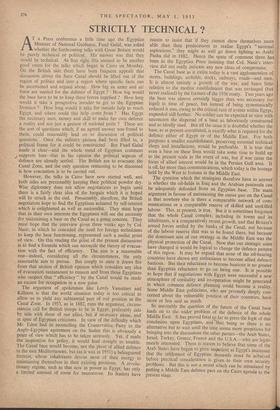STRICTLY TECHNICAL ?
T a Press conference a little time ago the Egyptian Minister of National Guidance, Fuad Galal, was asked whether the forthcoming talks with Great Britain would be purely technical or political. His answer was that they would be technical. At first sight this seemed to be another good omen for the talks which began in Cairo on Monday. On the British side there have been frequent appeals that discussion about the Suez Canal should be lifted out of the region of politics and into a region where specific facts can be ascertained and argued about. How big an army and air force are needed for the defence of Egypt ? How big would the base have to be to keep these forces supplied ? How long would it take a prospective invader to get to the Egyptian frontiers ? How long would it take for outside help to reach Egypt, and where could this help come ,from ? Has Egypt • the necessary men, money and skill to make her own defence a reality and not just a gesture of national pride ? These are the sort of questions which, if an agreed answer was found to them, could reasonably lead on to discussion of political questions. Once the military picture had been filled in, a political frame for it could be constructed. But Fuad Galal made it clear—and the whole trend of Egyptian comment ,d supports him—that in his opinion the political aspects of defence are already settled. The British are to evacuate the Canal Zone, and the only question remaining to be discussed is how evacuation is to be carried out.
However, the talks in Cairo have now started well, and both sides are presumably keeping their political powder dry. Wise diplomacy does not allow negotiations to begin until there is a fairly clear idea of the bargain which it is hoped will be struck in the end. Presumably, therefore, the British negotiators hope to find the Egyptians actuated by self-interest which is enlightened as well as nationalist. They must hope that in their own interests the Egyptians will see the necessity for,maintaining a base on the Canal as a going concern. They must hope that the interview given three weeks ago by Col. Nasir, in which he conceded the need for foreign technicians to keep the base functioning, represented such a realist point of view. On this reading the point of the present discussions is to find a. formula which can reconcile the theory of evacua- tion with the fact of efficiency. The aim is a reasonable one—indeed, considering all the circumstances, the only reasonable aim to pursue. But simply to state it draws fire from that section of British opinion which considers any idea of evacuation tantamount to treason and from those Egyptians who suspect that " efficiency " by the Canal would be made an excuse for occupation in a new guise.
The argument of spokesmen like Lords Vansittart and Killearn is that the world situation today is too critical to allow us to yield any substantial part of our position in the Canal Zone. In 1953, as in 1882, runs the argument, circum- stances call for British troops to be in Egypt, preferably side by side with those of our allies, but if necessary alone, and in spite of Egyptian criticisms. In view of the difficulty which Mr. Eden had in reconciling the Conservative Party to .the Anglo-Egyptian agreement on the Sudan this is obviously a point of view which has to be taken seriously. Yet, if made the inspiration for policy, it would lead straight to trouble. The Canal base would become, not the pivot of allied defence in the east Mediterranean, but (as it was in 1951) a beleaguered fortress, whose inhabitants devote most of their energy to maintaining themselves in their existing positions. A revolu- tionary regime, such as that now in power in Egypt, has only a limited amount of room for manoeuvre. Its leaders have reason to insist that if they cannot show themselves more able than their predecessors to realise Egypt's " national aspirations," they might as well go down fighting as Arabi Pasha did in 1882. Hence the spate of comment there has been in the Egyptian Press insisting that Col. Nasir's inter- view did not really indicate any new ideas of compromise.
The Canal base as it exists today is a vast agglomeration of stores, buildings, airfields, docks, railways, roads—and men. It is almost entirely a growth of the war, and bears little relation to the modest establishment that was envisaged (but never realised) by the framers of the 1936 treaty. Two years ago the base was almost certainly bigger than was necessary (or legal) in time of peace, but instead of being systematically reduced it was, owing to the critical turn of events within Egypt, expanded still further. No soldier can be expected to view with Unconcern the dispersal of a base so laboriously constructed and so ideally sited. But all the same it is doubtful whether the base, as at present constituted, is exactly what is required for the defence either of Egypt or of the Middle East. For both purposes a smaller establishment, preserving essential technical shops and installations, would be preferable. It is true that even a base on these lines, would take some time to build up to the present scale in the event of war, but if war came the focus of allied interest would be in the Persian Gulf area. It is oil, far more than communications, which today is the hostage held by the West to fortune in the Middle East.
The question which the strategists therefore have to answer is whether the oil-fields in Iraq and the Arabian peninsula can be adequately defended from an Egyptian base. The main argument in favour of maintaining the status quo on the Canal is that nowhere else is there a comparable network of com- munications or a comparable reserve of skilled and unskilled labour. This, at present, is true. But it is sometimes forgotten that the whole Canal complex, including its towns and its inhabitants, is a comparatively recent growth, and that Britain's armed forces settled by the banks of the Canal, not because of the labour reserve that was to be found there, but because the dominant aim of our strategy in the Middle East was the physical protection of the Canal. Now that our strategic aims have changed it would be logical to change the defence pattern of this region. It may be argued that none of the oil-bearing countries have shown any enthusiasm to become allied defence bastions. But their reluctance to become bastions is no greater than Egyptian reluctance to go on being one. It is possible to hope- that if negotiations with Egypt were successful a new atmosphere of cordiality and co-operation might be generated in which common defence planning could become a reality. Some Middle East politicians, who are privately deeply con- cerned about the vulnerable position of their countries, have more or less said as much. .
So inevitably the question of the future of 'the Canal base leads on to the wider problem of the defence of the whole Middle East. It has proved fatal so far to press the logic of this conclusion upon Egyptians, anrlhat being so there is no alternative but to wait until the time seems more propitious for bringing into the discussions the other parties—the Arab States, Israel, Turkey, Greece, France and the U.S.A.—who are legiti- mately interested. There is reason to believe that some of the Arab States have begun to grow impatient at Egypt's insistence that the settlement of Egyptian demands must be achieved before practical consideration is given to their own security problems. But this is not a mood which can be stimulated by putting a Middle East defence pact on the Cairo agenda at the present stage. The fact that the Cairo conversations are opening in a period of nominal détente will make the western political case harder to press. The last time British and Egyptian negotiators sat round a table to discuss defence problems—in 1948—most of the British assumptions, about the chances of war and Egypt's ability to meet an emergency, were challenged by the Egyptians. But there are two differences today. On the Egyptian side are now soldiers, who know what their country needs and how those needs can be met. And in the second place it must be assumed that on both sides There is not only a wish for the conversations to succeed, but also an atmosphere of potential success. These were conspicuously lacking five years ago. Today the effects of the Sudan agreement have not entirely worn off, and the latest news from the Sudan seems to show that the agreement is being successfully translated into practical terms by British and Egyptian officials working side by side with those of other nationalities. If the Cairo discussions are kept on a technical level as long as possible, and if they are kept strictly secret all the time, there is a more than fair chance that they will be successful also.



































 Previous page
Previous page